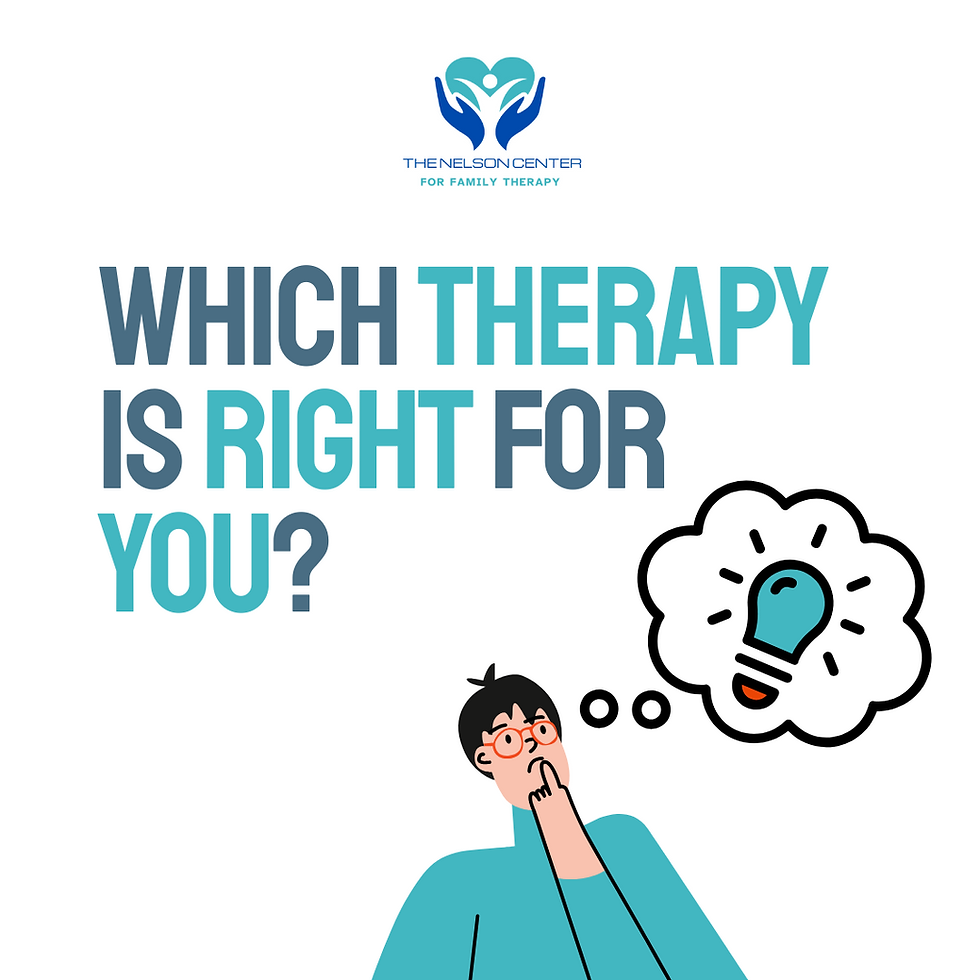CBT, DBT, and MCBT: Which Therapy Approach Is Right for You?
- Jennifer Humphreys

- Jul 23, 2025
- 2 min read

At The Nelson Center for Family Therapy, we know that no two people are exactly alike—and neither are their paths to healing. That’s why our therapists are trained in a wide range of evidence-based approaches, including Cognitive Behavioral Therapy (CBT), Dialectical Behavior Therapy (DBT), and Mindfulness-Based Cognitive Behavioral Therapy (MCBT).
Our founder, Jennifer Humphreys, personally practices and trains our team in MCBT, while also supporting therapists in learning a variety of other modalities. This creates a rich and personalized therapeutic experience for each client who walks through our doors.
Here’s a closer look at three of the core approaches we use:
What Is CBT?
Cognitive Behavioral Therapy (CBT) is one of the most widely used forms of therapy today. It focuses on identifying and changing unhelpful thought patterns that impact our feelings and behaviors.
CBT is especially helpful for:
Anxiety and stress
Depression
Low self-esteem
Negative thinking
Phobias and fears
CBT is typically structured and goal-oriented, helping clients build awareness of their thoughts and learn practical tools to shift their mindset and behaviors.
What Is DBT?
Dialectical Behavior Therapy (DBT) was developed to help people who experience intense emotions or have difficulty with emotional regulation. It blends cognitive-behavioral strategies with mindfulness and acceptance.
DBT teaches skills in four key areas:
Mindfulness
Distress tolerance
Emotion regulation
Interpersonal effectiveness
DBT is a compassionate, skill-building approach that helps clients find balance between accepting themselves as they are and making meaningful changes.
What Is MCBT?
Mindfulness-Based Cognitive Behavioral Therapy (MCBT) integrates mindfulness practices with the structured, thought-focused work of CBT. It’s especially effective for people dealing with chronic stress, anxiety, or depression that tends to return in cycles.
With MCBT, clients learn to observe their thoughts without judgment, stay present in the moment, and reduce reactivity to stress or negative emotions.
At The Nelson Center, Jennifer Humphreys leads with this approach and trains other clinicians in using MCBT with sensitivity and skill.
A Personalized Path to Healing
CBT, DBT, and MCBT each offer powerful tools—but they’re just a few of the many therapeutic methods our team uses. Jennifer Humphreys and our therapists are trained in multiple modalities (you can see the full list on our Psychology Today profile), allowing us to tailor treatment to each client’s needs, goals, and personality.
Whether you’re looking for practical strategies, emotional growth, or mindful awareness, our team is here to support you.
Interested in learning more or starting therapy? We’d love to help you find the right approach for your journey.
Reach out to schedule a consultation with one of our skilled therapists today.
📞 (248) 301-1080


Comments